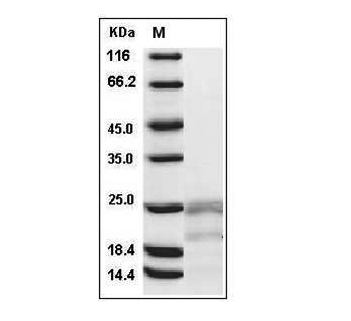| Product name | Human IFN-γ protein |
| Sequence | Amino acid sequence derived from human IFN-γ (NP_000610.2) (Met 1-Gln 166) was expressed and purified. |
| Activity | Measured in antiviral assays using WISH human amnion cells infected with vesicular stomatitis virus (VSV). The EC50 for this effect is typically 0.1-0.5 ng/mL. . The EC50 for this effect is typically 0.1-0.5 ng/mL. |
| Protein length | The secreted recombinant human IFN-γ consists of 143 amino acids and has a predicted molecular mass of 16.7 kDa. γ-IFN migrates as two bands with apparent molecular mass of 21&25 kDa probably due to different glycosylation. |
| Preparation method | CHO Stable Cells |
| Purity | > 92 % as determined by SDS-PAGE |
| Alternative | IFG; IFI; IFN gamma; Interferon Gamma; Interferon gamma; IFNG |
| Formulation | Lyophilized from sterile PBS, pH 7.4 |
| Molecular weight | 16.7 kDa |
| Usage notes | Always centrifuge tubes before opening. It is recommended to reconstitute the lyophilized Human IFN-gamma protein in sterile ddH2O not less than 100µg/ml, which can then be further diluted to other aqueous solutions. |
| Storage instructions | Lyophilized Human IFN-γ proteinshould be stored desiccated below -20°C. Upon reconstitution, the protein should be stored at 4°C between 2-7 days and for future use below -20°C. For long term storage it is recommended to add a carrier protein (0.66% HSA or BSA). Please prevent freeze-thaw cycles. |
| Shipping | The product is shipped at ambient temperature. |
| Precautions | The product listed herein is for research use only and is not intended for use in human or clinical diagnosis. Suggested applications of our products are not recommendations to use our products in violation of any patent or as a license. We cannot be responsible for patent infringements or other violations that may occur with the use of this product. |
| Background | IFN-γ, also known as IFNG, is a secreted protein which belongs to the type I I interferon family. IFN-γ is produced predominantly by natural killer and natural killer T cells as part of the innate immune response, and by CD4 and CD8 cytotoxic T lymphocyte effector T cells once antigen-specific immunity develops. IFN-γ has antiviral, immunoregulatory, and anti-tumor properties. IFNG, in addition to having antiviral activity, has important immunoregulatory functions, it is a potent activator of macrophages, and has antiproliferative effects on transformed cells and it can potentiate the antiviral and antitumor effects of the type I interferons. The IFNG monomer consists of a core of six α-helices and an extended unfolded sequence in the C-terminal region. IFN-γ is critical for innate and adaptive immunity against viral and intracellular bacterial infections and for tumor control. Aberrant IFN-γ expression is associated with a number of autoinflammatory and autoimmune diseases. The importance of IFN-γ in the immune system stems in part from its ability to inhibit viral replication directly, and most importantly from its immunostimulatory and immunomodulatory effects. IFNG also promotes NK cell activity. |
| Gene ID | 3458 |
| Alternative | IFG; IFI; IFN gamma; Interferon Gamma; Interferon gamma; IFNG |
| Others | The Endotoxin level is less than 1.0 EU per μg of the protein as determined by the LAL method |
| Accession | NP_000610.2 |

Fig.SDS-PAGE analysis of Human IFN-gamma protein.
Author:D Qu, H Guo, Y Xu Publication name:Journal of Interferon & Cytokine Research IF:3.2
Author:Qu D, Guo H, Xu Y Publication name:J Interferon Cytokine Res IF:2.032
You must be logged in to post a review.
Reviews
There are no reviews yet.